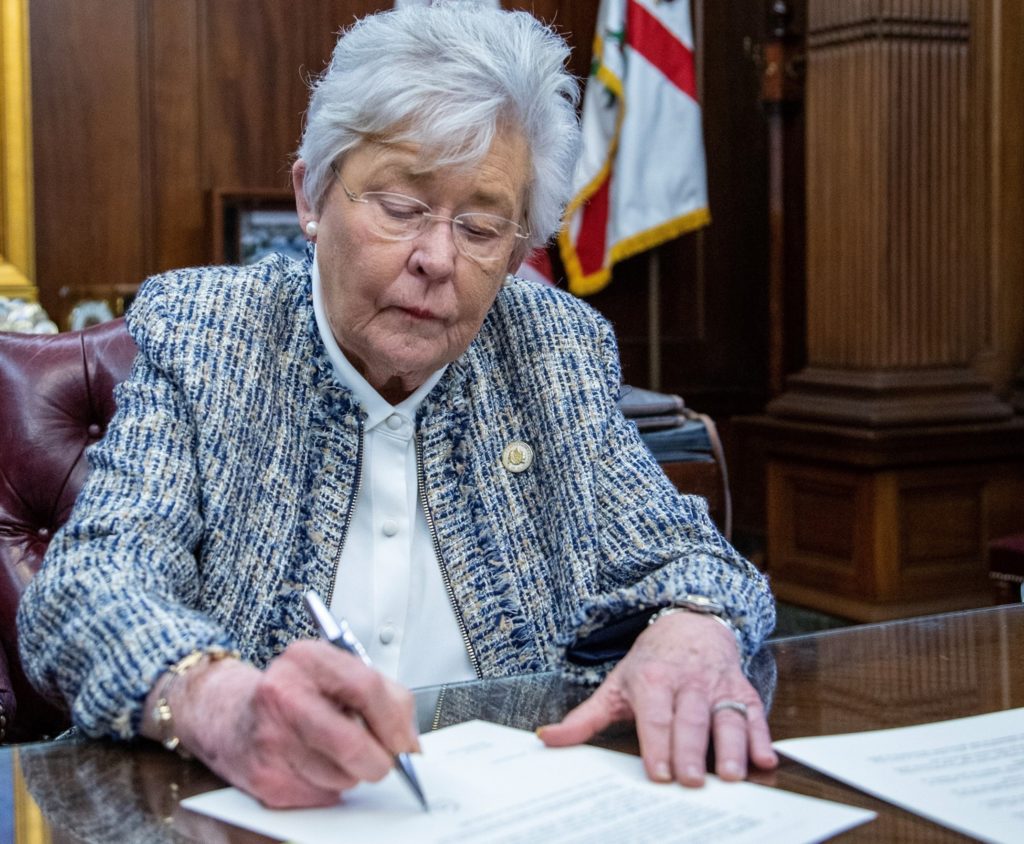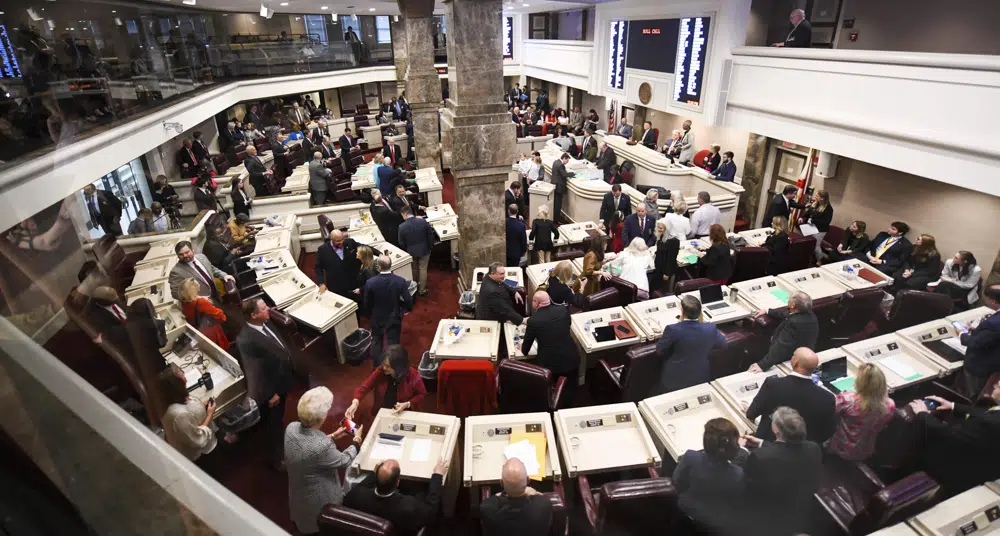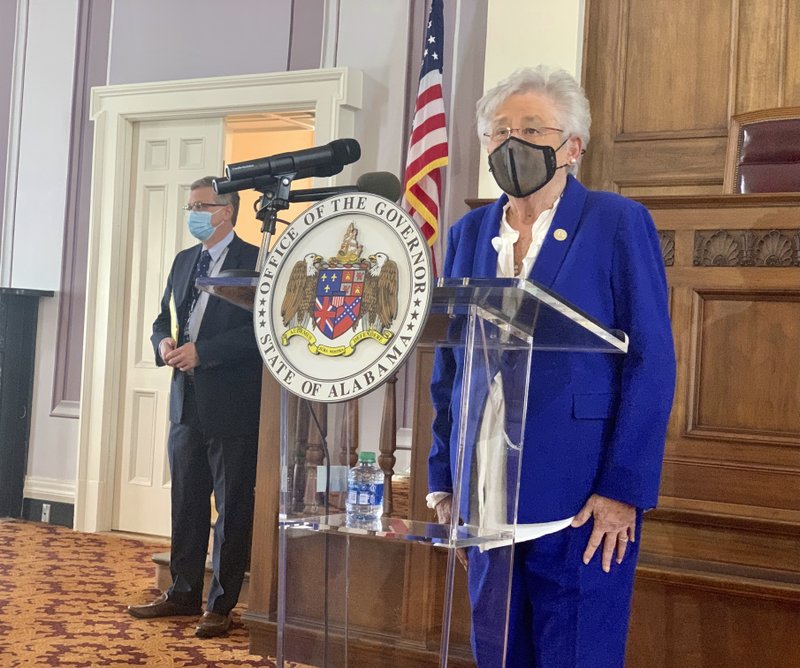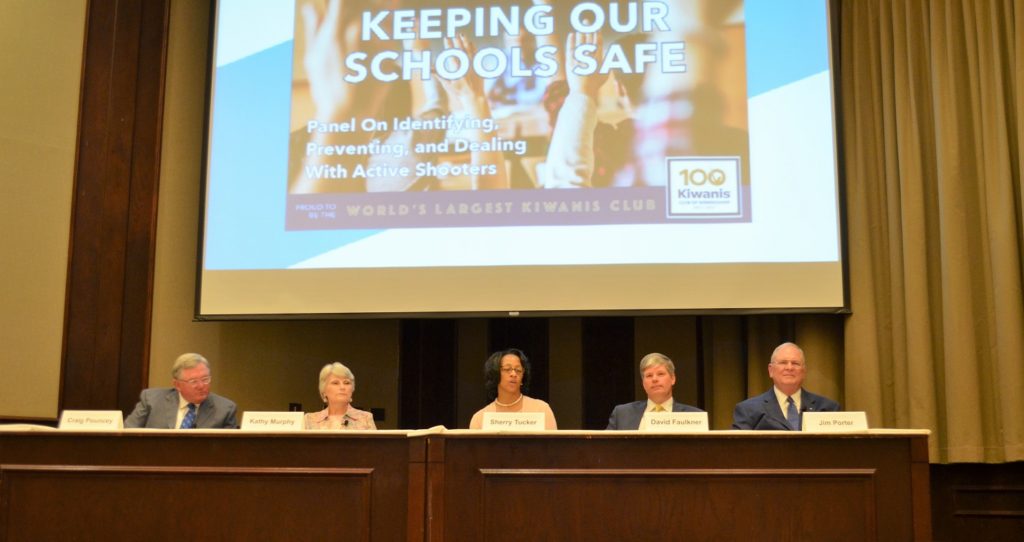House passes legislation making it illegal for persons under 21 to possess or purchase vape products

On Tuesday, May 16, the Alabama House of Representatives passed legislation to prevent children from being able to buy vape products. The bill bans the sale of vapes to anyone under 21. It also established the Alcohol Beverage Control Board as the agency tasked with enforcing these regulations. House Bill 319 (HB319) is sponsored by State Representative Barbara Drummond. “This is another bite at the vaping apple,” Drummond said. “The purpose of this bill is to protect young people under 21 from vaping,” Drummond said. “This makes it illegal to purchase, possess, or transport any vaping products.” HB319 expands the definition of electronic nicotine delivery systems to include vape products that do not contain nicotine. Drummond explained that her previous legislation was difficult to enforce. “We will now have an opportunity for ABC to help,” Drummond said. “I have gotten 1200 vaping violations this year.” “There will be consequences for those kids that are continually vaping in our communities,” Drummond added. Drummond asked that the body adopt the substitute version of the bill prepared by the House Judiciary Committee. Rep. A.J. McCampbell (D-Livingston) said, “I am glad to know that we are going to have something out there, and I look forward to voting for it.” “Our children are exposed to a lot of things that frankly they should not be exposed to,” McCampbell said. Drummond said, “This is for the health of our young people.” “We did not have the enforcement,” in my previous bill Drummond said. Under existing law, there is no fee for a permit to distribute tobacco, tobacco products, electronic nicotine delivery systems, e-liquids, or alternative nicotine products. This bill would require a one-time application fee and an annual permit fee for the distribution of those products and would provide for the distribution of those fees. “We do not get any money from this industry now,” Drummond explained. “I have worked with more groups on this piece of legislation.” Drummond said, “I am only concerned with young people 21 years and younger.” McCampbell said, “You have evolved from one level of understanding and moved to another level of understanding on this topic.” Rep. Mark Shirey said, “We are going to have some long-term health problems from vaping.” Drummond explained that the bill creates “a graduated penalty process for those young people who vape and who continue to vape, especially on school campuses.” The House voted to adopt the committee substitute. Rep. David Faulkner brought an amendment to the bill as substituted. “It has how the fees should be collected and how the fees should be distributed,” explained Faulkner. “On the punishment on sellers, it makes this penalty a ‘shall’ so they will receive that punishment. It is not an issue of ‘may.’” Drummond said. “I think this will be a great amendment, and I appreciate you working with me.” Rep. Napoleon Bracy asked, “Can you tell me a little about the penalties? The penalties are enforced by the ABC Board?” “Yes, that is correct,” Faulkner said. “It is a graduated penalty. So on a first violation, a $500 fine, or subsequent $700, then $1000. Eventually, you will lose your permit.” The amendment was adopted on a vote of 101 to 0. Rep. Curtis Travis said, “It is a major problem for school systems. Thank you for bringing this bill.” Rep. Ron Bolton said, “I want to thank you for bringing this bill and the bipartisan way that you worked on it.” HB319 passed the Alabama House of Representatives 100 to 1. It now goes to the Senate for their consideration. Vape industry representatives have contacted Alabama Today and expressed their unhappiness with the definitions in the bill. Additionally, they insist that their products are far safer than smoking and that further cracking down on vape products in Alabama will only lead to products being brought across state lines. HB319 has been referred to the Senate Judiciary Committee, which meets next on Wednesday at 8:30 a.m. in Room 325 of the Statehouse. The committee agenda has not been posted as of press time. Tuesday will be day 24 of the 2023 Alabama Regular Legislative Session. To connect with the author of this story or to comment, email brandonmreporter@gmail.com.
Governor will host a ceremonial bill signing for legislation passed during 2023 Regular Session

On Tuesday, Alabama Governor Kay Ivey will host a series of bill-signing ceremonies to celebrate the passage of several pieces of legislation that addressed concerns facing the state of Alabama. Ivey will sign several bills, including reform of the state’s adoption laws. House Bill 101 (HB 101) is sponsored by State Representative Ginny Shaver and State Senator Arthur Orr. This bill streamlines the state’s adoption process and updates the current adoption law language. (Act 2023-092). “Alabama has consistently set state records for adoptions and placed thousands of children in loving, forever homes,” said Gov. Ivey. “Currently, we have more than 5,000 children in the foster care system, and with this modernized and streamlined process now in place, we have positioned Alabama on even firmer footing and will be able to provide more of our children with the life they deserve.” House Bill 66 (HB66) by Rep. Joe Lovvorn and Sen. Andrew Jones allows certain firefighters, law enforcement officers, and correctional officers, covered under the ERS or TRS, to purchase hazardous duty time for prior service. (Act 2023-101). HB66 removes the time limitations for Tier I firefighters, law enforcement officers, and correctional officers covered under the Employees’ Retirement System or the Teachers’ Retirement System to purchase eligible service credit prior to January 1, 2003. House Bill 164 (HB164) by Rep. Andy Whitt and Sen. Jay Hovey requires high school students to complete a personal financial literacy and money management course before graduation. (Act 2023-179). “I have got story after story from thirty years of banking experience of young people who did not have a checking account,” said Whitt. “They go to convenience stores and check cashing places to get their paychecks cashed. One young fellow was working two hours a week just to be able to get his check cashed each week.” Senate Bill 131 (SB 131) by Sen. Vivian Figures and Rep. Steve Clouse. This bill transfers the regulation of preneed funeral contracts from the Department of Insurance to the Alabama Board of Funeral Services. (Act 2023-094). The Alabama Preneed Funeral and Cemetery Act of 2023 transfers the existing Preneed Funeral and Cemetery Act and the regulation of preneed contracts from the Commissioner and Department of Insurance to the Alabama Board of Funeral Service. It authorizes the Department of Insurance to temporarily transfer certain funds to the board to defray costs associated with the administration and operation of the Alabama Preneed Funeral and Cemetery Act of 2023; Senate Bill 28 (SB28) by Sen. Tim Melson and Rep. Randy Wood would expand the scope of practice of podiatry to include treatment of the foot and ankle. (Act 2023-106). Podiatrists in most states are already allowed to treat disorders of the ankle. This expansion of the scope of practice to come in line with national standards was long overdue. Senate Bill 104 (SB 104) by Sen. Chris Elliott and Rep. David Faulkner revises the current Dram Shop Act by addressing liability for providers of alcohol if a recipient injures a third party. (Act 2023-025) . Before this, only three insurance carriers would insure restaurants and bars from lawsuits due to the liability. This will make it harder for plaintiffs’ attorneys to prove a case against the establishment that sold the alcohol. House Bill 56 (HB56) by Rep. Frances Holk-Jones and Sen. Linda Coleman-Madison will expand the scope of practice for licensees of the Alabama Board of Social Work Examiners. (Act 2023-100). This will allow specially trained social workers with master’s degrees to diagnose mental illnesses. House Bill 62 (HB 62) by Rep. Ben Robbins and Sen. Keith Kelley will extend the amount of time that nonprofit veterans’ organizations have to comply with state and local building codes when acquiring a former armory building. (Act 2023-175). This bill primarily deals with an armory in Sylacauga owned by the American Legion and used by the Alabama National Guard. When the National Guard shut down its presence, it transferred back to the American Legion. The NG never updated the building during its tenure, so it lacks the sprinkler system needed to comply with state building code requirements. Tuesday will be day 24 of the 2023 Alabama Regular Legislative session. Kay Ivey has been governor since 2017. To connect with the author of this story or to comment, email brandonmreporter@gmail.com.
House considers legislation to create an internet porn registry and require porn sites to have age verification

On Wednesday, the Alabama House Judiciary Committee considered legislation that would require any company that would distribute pornography over the internet to consumers in the state of Alabama to register with the state of Alabama, and that site must have some form of age verification to make sure children cannot access pornography. House Bill 441 (HB441) is sponsored by State Representative Ben Robbins. HB441 is cosponsored by House Majority Leader Scott Stadthagen and Rep. Jamie Kiel. “This bill is trying to prevent children from having access to pornography,” Robbins said. “A company that wanted to distribute pornography would be required to register with the state of Alabama.” Robbins said that this bill is necessary to protect children from the harmful effects of pornography, “The more hyper-sexualized you are, the more violent you become to your partner of the opposite gender,” Robbins explained. “After the registration, a commercial entity is required to have an age verification process to verify that you are at least 18 years old. In some states, they use biometrics. That could be off a credit report. Robbins offered a substitute to the version of the bill that he had originally introduced. “The sub changes some of the language that Rep. (Matt) Simpson had about privacy rights,” Robbins said. “It also addresses the cause of action questions that Rep (David) Faulkner had.” Robbins explained that the substitute makes it severable if one portion of the act is declared unconstitutional, then the rest of the act can remain in place. Robbins added that the bill includes language so that “if they (the porn company) save any data from you, then you would have a cause of action.” Rep. Ontario Tillman asked, “Is this patterned after a similar statute?” Robbins said that initially, his bill was all original but has borrowed some language from bills in other places. “No state or country, as far as I know, have a registration component.” The synopsis states, “This bill would provide legislative findings regarding the public health crisis caused by pornography. This bill would prohibit the distribution of material harmful to minors under 18 years of age. This bill would require distributors of material harmful to minors to take certain reasonable measures to ensure their published material is not distributed to minor children by use of age verification procedures. This bill would require distributors of material harmful to minors to pay a licensing fee to distribute pornography in this state and would provide for the distribution of the fee. This bill would also provide penalties for violations.” A study by the Children’s Commissioner for England found that one out of ten children have watched pornography by the time they are nine years old. Four out of five (79%) surveyed have seen pornography involving violence by the age of 18. One in three young people have actively sought out depictions of sexual violence such as physical aggression, coercion, and degradation. The report, by Dame Rachel de Souza, also points to the harmful effects of exposure to violent pornography. Nearly half of the 16- to 21-year-olds who took part in the survey assumed girls either “expect” or “enjoy” sex that involves physical aggression, such as airway restriction. “Throughout my career as school leader, I have witnessed the harmful impact of pornography on young people. I will never forget the girl who told me about her first kiss with her boyfriend, aged 12, who strangled her. He had seen it in pornography and thought it normal,” she wrote in the foreword to her report. On Tuesday, the Alabama House of Representatives passed legislation to further protect children from pornography by requiring that all new cell phones sold in the state have their installed porn filters turned on. To connect with the author of this story or to comment, email brandonmreporter@gmail.com.
Alabama Legislature advances legislation requiring that American iron be used in public works projects

Last week, the Alabama State Legislature passed legislation requiring that American iron be used in all Alabama public works projects. House Bill 157 (HB157) is sponsored by State Representative David Faulkner. According to the synopsis, “Under existing law, when a public works contract requires the use of steel, the contractor performing the contract is required to use steel produced within the United States. This bill would provide that when a public works contract requires the use of iron, the contractor performing the contract would be required to use iron produced within the United States.” The Senate Fiscal Responsibility and Economic Development Committee voted unanimously to give the bill a favorable report Wednesday. Sen. Garlan Gudger chairs the committee. Rep. Faulkner told the Committee that HB157 requires that for public works projects. “You use American iron and steel. Federal law is already that way,” Faulkner said. Sen. Josh Carnley asked, “Are we putting anybody at a disadvantage?” “No, we are not,” Faulkner answered. “We have several iron manufacturers in Alabama.” Faulkner explained that Alabama law already requires the use of American steel. This legislation simply adds iron to it so that state law matches federal law. HB157 passed the Senate on a 32 to 0 vote. It has already passed in the House, so it now goes to Governor Kay Ivey for her consideration. As of Tuesday, 765 bills have been introduced in this legislative session. Tuesday was Day 19 of the 2023 Alabama Regular Legislative Session. To connect with the author of this story or to comment, email brandonmreporter@gmail.com.
Legislature passes DRAM shop reform legislation

On Tuesday, April 11, the Alabama Legislature passed legislation that sponsors hope will lower insurance costs for bars and restaurants serving alcohol. Senate Bill 104 (SB104) was sponsored by State Senator Chris Elliott. It had 15 Republican cosponsors in the Senate, including Majority Leader Clay Scofield. SB104 was carried in the Alabama House of Representatives by State Representative David Faulkner. Under current law, if a person becomes intoxicated at a bar, nightclub, or restaurant that serves alcohol and then is involved in an accident afterward, Alabama has a “strict liability” in place where the owner of the establishment that served the alcohol can be held civilly liable for that accident by the persons harmed or killed by the intoxicated person. This is the strongest standard under the law in the nation. Because of this high liability standard, only three insurers are willing to sell liability insurance in Alabama. This insurance is called DRAM shop coverage. The law requires that coverage as a condition of having a liquor license, but the required $100,000 coverage can cost as much as $35,000. One insurance carrier has threatened to pull out of college towns, including Auburn and Tuscaloosa. SB104 replaces that strict liability standard in the law with a new standard that lessens the liability on the owners of bars, nightclubs, and restaurants. SB104 creates a standard under which a server would have to knowingly serve a visibly intoxicated person, and for that service to be the proximate cause of an injury or death for the business to be liable. This legislation is being passed at the urging of the hospitality, insurance, retail, and tourism industries. 11 trade associations came together to press for this legislation. That alliance includes the: Alabama Beverage Licensees Association, Alabama Brewers Guild, Alabama Grocers Association, Alabama Independent Insurance Agents, Alabama Restaurant and Hospitality Association, Alabama Retail Association, Alabama Tourism Partnership, Business Council of Alabama (BCA), Gulf United Metro Business Organization (GUMBO), National Federation of Independent Businesses, and the Petroleum and Convenience Marketers of Alabama. Dothan Attorney Pamela Halford said, “In Alabama, if you have served alcohol to a person who later becomes intoxicated and causes damages, you are responsible for those damages whether or not the person was intoxicated at the time of sale or not. This is a strict liability scheme and resulted in only three insurance carriers willing to write liability insurance coverage for liquor liability. Obviously, this is problematic for those in the retail and hospitality industry. Accordingly, several organizations got together and lobbied for what passed yesterday – which was Senate Bill 104, which removes the strict liability scheme and instead requires knowingly to someone who is visibly intoxicated before you can be responsible for any resultant damages. This removes the strict liability scheme and hopefully make it easier for you to get liquor liability insurance in the State of Alabama.” House Bill 158 was the companion bill introduced in the House. SB104 passed the House of Representatives 104 to 0. It has already passed the Senate and will head to the Governor’s desk for her signature. Tuesday will be day 11 of the 2023 Alabama Regular Legislative Session. To connect with the author of this story or to comment, email brandonmreporter@gmail.com.
House committee advances legislation to send parents to jail if their child brings a gun to school

On Wednesday, the House Judiciary Committee voted to advance controversial legislation that would hold parents criminally responsible if their child brings their gun onto a school campus, even if the weapon is not used in any sort of criminal mischief. House Bill 123 (HB123) is sponsored by State Rep. Barbara Drummond. “This bill does not violate anyone’s Second Amendment right,” Drummond told the committee. “This is a bill that makes parents responsible.” State Rep. Tim Wadsworth asked, “A parent can be charged with a crime?” “Yes, if that weapon is not reasonably secured,” said Drummond. Drummond explained that “reasonably secured” could “be a trigger lock, in a lockbox, or a gun safe,” but is not defined exclusively by those means. Rep. Shane Stringer asked, “Can we do a bill that says if a weapon is used.” Drummond responded, “I don’t want to wake up tomorrow and see that weapon was used on a school. There is a responsibility to being a parent.” Drummond explained that the gun would have to belong to the parent or guardian. The committee approved an amendment to change the penalty from a Class D felony to a Class A misdemeanor. Rep. David Faulkner asked if the parent would be criminally liable if the child brought the gun to school, even if the gun was determined to be “reasonably secured” with a trigger lock. “If it is brought to school with a trigger lock, it would be ‘reasonably secured,’” under this bill, Drummond answered. Rep. David Standridge said, “I represent a rural district where hunting is popular.” Standridge explained that his area had had an incident where a student went hunting after school and forgot to take the rifle out of his truck, so they went to school the next day with the rifle still in the gun rack. Standridge asked if this bill would apply to an incident like that. “This is 17 and under,” Drummond replied. “That older student who is going hunting this would not address this.” Stringer asked, “How would this affect other people in the household?” “This is germane only to the parents,” Drummond said. “There is a ton of guns that are being confiscated on school campuses.” Wadsworth asked, “What if it was a grandparent?” Drummond answered, “This applies to parent or guardian.” “Most grandparents who look after their grandchildren do not get legal guardianship,” Wadsworth said. State Rep. Christopher England said, “What you are doing is not a foreign concept to the law. In juvenile court, we charge parents with contributing to the delinquency of a minor. All we are talking about is responsible gun owners. If you are a responsible gun owner you should not have a problem with this bill.” A total of three amendments were added to the bill in committee. HB123 received a favorable report in a close vote. The bill can be considered by the full House of Representatives as early as Thursday. Thursday will be day 10 of the 2023 Alabama Regular Legislative Session. To connect with the author of this story or to comment, email brandonmreporter@gmail.com.
House Committee advances bill to combat youth gang violence

On Wednesday, the Alabama House Judiciary Committee voted to advance legislation that would prosecute 16-year-olds as adults if they are found to be affiliated with a gang. House Bill 191 (HB191) was sponsored by State Representative Allen Treadaway. “I was asked to carry HB191 by the Alabama Attorney General’s (Steve Marshall) office and with good reason,” Treadaway said. Treadaway is retired as a deputy Birmingham police chief. “I spent 31 years in law enforcement, and this is alarming,” Treadaway of the growing gang violence problem in Birmingham, Mobile, Montgomery, and communities across Alabama. “If we don’t do something with the type of behavior this bill is trying to address, we are going to have a lot more innocent victims,” Treadaway warned. “We have had innocent victims who have been hurt and are dying all across the state.” The Alabama Gang Prevention Act provides penalty enhancements for felonies committed to further the interests of a gang, attaches a minimum sentence to any use of a firearm to promote the gang, and certifies individuals aged 16 and older as adults when charged with gang-related offenses under the Act. Treadaway presented a letter from sheriffs and police chiefs across Alabama supporting HB191. “Just about every sheriff and police chief has signed on to this,” Treadaway said. Rep. Christopher England spoke in opposition to the bill. “Do we not have any other answer other than locking people up?” England said. “The more people we put in prison, the less space we have for the people that really need to be there.” “We have the same problem in Tuscaloosa,” England said. “There is another answer out there other than put them in jail for as long as possible.” Rep. Ontario Tillman said, “We are going to lock up a kid because he is associated with a gang member or law enforcement thinks he is.” Tillman made a motion to send HB191 to a subcommittee. Rep. Jim Hill chairs the House Judiciary Committee. “The NOs have it,” Hill said after a voice vote. Rep. Penny McClammy said, “Why is the first thing we think about is tougher punishment, but we never address the problem.” McClammy suggested that the state should develop some sort of a program for those kids who are in and out of trouble. “Unfortunately, there are individuals that fall through the cracks and commit very violent crime,” Treadaway said. “They have been afforded every opportunity. Unfortunately, those people are hell-bent on killing people.” “I care more about the victims,” Treadaway said. “We better have a place to put them, or there is going to be another victim. Look at the folks left behind by the violence. It leaves children without a father or a mother.” State Rep. David Faulkner made a motion to give HB191 a favorable report. The motion passed. HB191 received a favorable report. The House could consider HB191 as soon as Thursday. According to the synopsis, “This bill would identify gang members. This bill would enhance penalties for any criminal activity that benefits, promotes, or furthers the interest of a gang. The bill would establish mandatory consecutive penalties for any individual who knowingly possesses, uses, or carries a firearm during the commission of any act intended to benefit, promote, or further the interest of a gang. Under existing law, juveniles 16 years of age or older are tried as adults for certain crimes. This bill would require any juvenile 16 or older to be tried as an adult for any gang-related criminal activity.” Senate Bill 143 (SB143) is the Senate version of the same bill. SB143 is sponsored by Sen. Will Barfoot. Thursday will be day 10 of the 2023 Alabama Regular Legislative Session. To connect with the author of this story or to comment, email brandonmreporter@gmail.com.
Steve Flowers: Incumbency prevails in 2022 State House races

Folks, believe it or not, we are closing in on six months before next year’s election year. The primary election is set for May 24, 2022. In Alabama, all our major constitutional officers are on the ballot next year. The governor’s office is the premier race in the state, and that coveted and powerful post is set for its four-year quadrennial run. Therefore, this big political year is referred to as the gubernatorial year. Those of us who follow Alabama politics have been salivating with anticipation for a cavalcade of great races. However, the power of incumbency has devasted the big year into a yawn. All the major state offices are held by popular incumbents, who are either running unopposed or have minimal opposition. The consolation prize was that there would be the legislative races. After all, this is where the real power in the state rests. You can simply look at where the special interest and PAC money is spent to verify that fact. However, the omnipotent power of incumbency has also encroached on those races. The Alabama House of Representatives has 105 members. There are 77 Republicans and 28 Democrats. The large majority of incumbents are running for reelection – both Republicans and Democrats. The overwhelming majority of these incumbents will have no opposition. However, in the House, there will be some major changes in leadership because of retirement or moving on to new posts. Speaker of the House Mac McCutcheon is not running for reelection. This has created an interesting and spirited race within the Republican Caucus ranks for Speaker. In addition, Victor Gaston of Mobile, who is Speaker Pro Tem, is also retiring. Bill Poole of Tuscaloosa, who chaired the powerful House Ways and Means Education Budget Committee, has left the House to be the State Finance Director. House Rules Committee Chairman Mike Jones of Andalusia is running for the open Senate seat of retiring Senator Jimmy Holley. Two of the freshman House members are running for statewide office. Wes Allen of Troy is running for Secretary of State, and Andrew Sorrell of Tuscumbia is running for State Auditor. In addition, Connie Rowe of Jasper is leaving the House to become an administrative assistant to Lt. Gov. Will Ainsworth. Some of the veteran House members who are choosing to hang up their legislative cleats include Howard Sanderford of Huntsville, Mike Ball of Huntsville, K.L. Brown of Jacksonville, Kerry Rich of Marshall, Allen Farley of Jefferson, Harry Shiver of Baldwin, Mike Holmes of Elmore, and Becky Nordgren of Etowah. The most noteworthy retiree may be Representative Steve McMillan of Baldwin County, who is retiring after serving close to 43 years in the House. Steve has been a quiet yet very effective voice for the people of Baldwin County. They all will be missed. Some of the high profile and powerful members of the House, who will return for another four years with no or token opposition, are Steve Clouse of Ozark, Nathaniel Ledbetter of Dekalb County, and Danny Garrett, Jim Carns, David Wheeler, and David Faulkner of Jefferson. Danny Garrett has ascended to Chairman of the House Ways and Means Education. Other leaders returning are Chris Pringle, Reed Ingram, Randall Shedd, Tracy Estes, Chris Sells, David Standridge, Ginny Shaver, Jim Hill, Alan Baker, Joe Lovvorn, Chris Blackshear, Kyle South, Paul Lee, Jeff Sorrells, Rhett Marques, Steve Hurst, Joe Faust, and Margie Wilcox. The Democratic leadership will remain intact. There is an illustrious array of House Democratic leaders, including Anthony Daniels, Chris England, Laura Hall, Peb Warren, Barbara Boyd, A.J. McCampbell, Berry Forte, Dexter Grimsley, Thomas Jackson, Kevin Lawrence, Mary Moore, Juandalynn Givan, and veteran John Rogers. Two of the Democratic House veterans from Jefferson County, Louise Alexander and Merika Coleman, are both running for an open Jefferson County Senate Seat, leaving both their House seats up for grabs. There may be an increase in the number of females in the House of Representatives. It has already begun with the election of Cynthia Almond of Tuscaloosa, who was elected without opposition to replace Bill Poole. In addition, Patrice Penni McClammy won the Montgomery District 76 seat of her late father, Thad McClammy. She won with no opposition. See you next week. Steve Flowers is Alabama’s leading political columnist. His weekly column appears in over 60 Alabama papers. He served 16 years in the state legislature. Steve may be reached at www.steveflowers.us.
Alabama nears approval of ban on so-called vaccine passports

Alabama lawmakers on Monday inched forward to banning so-called vaccine passports that would prohibit proof of a coronavirus vaccination to enter a business, school, or event. The legislation would “prohibit the issuance of vaccine passports” by state agencies and prevent people from being denied entry to businesses, universities, schools, and state agencies if they have not been vaccinated for COVID-19. However, the legislation does not specify any penalty for violations. The Alabama House of Representatives voted 76-16 for the bill. The Alabama Senate must now decide whether to agree to minor House changes. “We need this bill. We don’t want to require people who are going to a business as a customer or going to a football game — or whatever it is — to be mandated to show a vaccine passport,” Rep. David Faulkner, R-Mountain Brook, said. Republicans across the country have backed bans on so-called vaccine passports even though they are not in widespread use anywhere, portraying them as a government intrusion into personal freedom and health choices. Some Alabama House Democrats criticized the bill after House Republicans stripped language that would have made exemptions for nursing homes and other health offices. “When does it become your right to pass on your illness on to someone else,” Rep. Mary Moore, D-Birmingham, said. Rep. Ralph Howard, D-Greensboro, said he is concerned about the people who will knowingly go into crowds without being vaccinated and are “willing to put other folks life in danger.” “Right now I know there are people out there that are not vaccinated that spread COVID,” Howard said. Rep. Paul Lee, R-Dothan, who handled the bill in the House, said businesses could still require customers to wear masks. He also said health offices could ask someone if they had been vaccinated and adjust safety protocols as needed. The idea of so-called vaccine passports is to have a document that shows you were vaccinated against COVID-19. Federal officials say there are no plans to make them broadly mandatory, but some Republican governors have issued orders barring businesses or state agencies from asking people to show proof of vaccination. Hawaii has a limited vaccine passport program for inter-island travel that allows people who received their vaccine shots in the state of Hawaii to skip testing and quarantine rules for travel between the islands. New York officials have launched a digital app New Yorkers can download to show proof of vaccination or a negative COVID-19 test. The Senate approved the bill earlier this session by a 30-0 vote. Republished with the permission of the Associated Press.
Lawmakers approve virus liability legislation

Alabama lawmakers on Thursday gave final approval to a bill the would shield businesses, health care providers and others from lawsuits from employees and customers who claim they were exposed to COVID-19. The bill would shield businesses, schools, health care providers, churches and others from lawsuits over COVID-19 exposure and treatment unless the person could prove the entity was acting with reckless or intentional misconduct. The House of Representatives voted 86-4 for the bill. It now moves to Alabama Gov. Kay Ivey for her signature. Ivey had named the bill — along with a bill to exempt coronavirus relief funds from state sales taxes and a third to renew the state’s pool of industrial recruitment incentives — as the top priorities for the first two weeks of the legislative session. Republican Rep. David Faulkner of Mountain Brook said the bill will discourage baseless lawsuits but not protect “bad actors” who recklessly ignore precautions. “This is going to give the protection to people, to these businesses, to these workers to get back out there without fear of needless lawsuits or really lawsuits that shouldn’t be filed,” Faulkner said. Rep. Napoleon Bracy, D-Prichard, said he supports the bill but is concerned the immunity will encourage conspiracy theorists and irresponsible people to continue to disregard COVID-19 precautions. He described how his family was infected because of people repeatedly flouting mask orders. “Families are being impacted, just like mine,” Bracy said. “We are about to vote to continue to protect them.” Republished with the permission of the Associated Press.
Alabama panel addresses school safety

As educators prepare for a new school year, leading their discussions is the issue of keeping students safe, in a time when no corner of the country seems immune to school violence. Tuesday, the Kiwanis Club of Birmingham hosted a school safety forum with two local superintendents, the president of the Alabama Education Association, a state legislator and the former president of the National Rifle Association. While they differ on how to keep students safe, they agreed on one point: Something needs to be done. In a perfect world, they said, every school would be assigned its own police officer, known as a school resource officer (SRO). Since most districts can’t afford police for every school, keeping students safe could mean installing metal detectors, adding security cameras or blocking outside entrances. For the more rural and poorer school systems, a new – and controversial – law allowing administrators to be armed under certain circumstances could help. The forum, “Keeping Our Schools Safe: Identifying, Preventing and Dealing with Active Shooters,” featured as panelists Craig Pouncey, superintendent of Jefferson County schools; Kathy Murphy, superintendent of Hoover city schools; Sherry Tucker, president of the Alabama Education Association; state Rep. David Faulkner, whose district includes Jefferson County; and Jim Porter, past president of the NRA. The Jefferson County school system is the state’s second-largest, with 36,000 students and 56 schools. Some of its schools are urban, others extremely rural. Some are 50-plus years old; others are state of the art. For the upcoming school year, the district bought 2,555 devices that add a secondary lock to classroom doors in a lockdown situation. The district added five SROs, bringing the total to 27. “We can’t put an SRO at every school, it’s just not financially feasible for us,” Pouncey said, adding that the additional five SROs cost the district $400,000 annually. He is not in favor of arming educators, a point agreed with by Murphy. Murphy said Hoover is “privileged” to have an officer stationed at every school, with three SROs assigned to each of the high schools. She’s been on the other side of that equation when she was superintendent of Monroe County schools. “In Monroe County, there was a little community known as Packers Bend. It took me an hour and 10 minutes to get from the central office to drive to that school, which was on the other side of the Alabama River,” she said. “It was always that little school that troubled me. Sixty-one children are in that school.” The program does not include teachers, and will require that the administrators successfully complete training created and certified by the Alabama Law Enforcement Agency. In rural areas, response time for first responders can be 45 minutes or more, said Faulkner. Those are the areas that could benefit from the new sentry program announced in May, which permits administrators in schools without an SRO to have a secured firearm on campus. The NRA’s National School Shield Program was created in 2012 following the fatal shooting of 20 students and six teachers at Sandy Hook Elementary School in Newtown, Connecticut. Porter, an attorney who was president of the NRA from 2013 to 2015, said the goal of the program is improving security and preventing future shootings. “The important takeaway here is that any school that needs help finding additional security measures, we will help free of charge,” he said, adding that no school system in Alabama has applied for the NRA’s help. After the forum, Birmingham Board of Education member Mary Boehm spoke about the March shooting at Huffman High School that left student Courtlin Arrington dead. “We have figured out that the student voice is what really matters,” Boehm said. “After the shooting at Huffman, it was clear that the students knew this gun was in the school. They know about guns that are in our schools every single day.” Mental health is one of the biggest challenges facing school systems, she said. “When I called my colleagues at mental health, I was told that funds have been cut so drastically that we are barely able to serve adults, let alone children,” Boehm said. “And we’re not prepared to handle that.” Republished with the permission of the Alabama Newscenter.
Here’s everyone who the BCA has endorsed in the 2018 election cycle

The Business Council of Alabama (BCA), considers itself Alabama’s foremost voice for business. It is a non-partisan, statewide, business association representing the interests and concerns of nearly 1 million working Alabamians. The BCA works with the Alabama Legislature to promote “pro-business” reforms such as: Tax credits for small business Job creation Incentives for economic development Ethics reform Positive changes in our public education system Here are the candidates who the BCA has endorsed, who they believe will bring the best changes and initiatives for Alabama’s businesses: Statewide Races: Governor: Kay Ivey Lieutenant Governor: Twinkle Cavanaugh Attorney General: Steve Marshall Secretary of State: John Merrill State Treasurer: John McMillan Commissioner of Agriculture and Industries: Rick Pate Judicial Races: Chief Justice: Lyn Stuart Associate Justice Place 1: Sarah Stewart and Brad Mendheim Associate Justice Place 2: Tommy Bryan Associate Justice Place 3: Will Sellers Associate Justice Place 4: Jay Mitchell Court Of Civil Appeals Place 1: Christy Edwards Court Of Civil Appeals Place 2: Judge Terri Thomas Court Of Civil Appeals Place 3: Judge Terry Moore Court Of Criminal Appeals Place 1: Richard Minor Court Of Criminal Appeals Place 2: Chris McCool Court Of Criminal Appeals Place 3: Judge Bill Cole State Senate Races Senate District 2: Tom Butler Senate District 3: Arthur Orr Senate District 5: Greg Reed Senate District 7: Mary Scott Hunter Senate District 12: Del Marsh Senate District 13: Randy Price Senate District 14: Cam Ward Senate District 16: Jabo Waggoner Senate District 17: Shay Shelnutt Senate District 18: Rodger Smitherman Senate District 32: Chirs Elliott State House Races House District 3: Humphrey Lee House District 6: Andy Whitt House District 8: Terri Collins House District 9: Scott Stadthagen House District 13: Connie Rowe House District 14: Richard “Bull” Corry House District 27: Wes Kitchens House District 30: Craig Lipscomb House District 36: Randy Wood House District 39: TJ Maloney House District 40: K.L. Brown House District 41: Corley Ellis House District 42: Jimmy Martin House District 43: Arnold Mooney House District 44: Danny Garrett House District 45: Dickie Drake House District 46: David Faulkner House District 47: David Wheeler House District 48: Jim Carns House District 49: April Weaver House District 50: Jim Hill House District 55: Rod Scott House District 73: Matt Fridy House District 87: Jeff Sorrells House District 88: Jeremy Arthur House District 89: Marcus Paramore House District 96: Matt Simpson House District 102: Willie Gray

